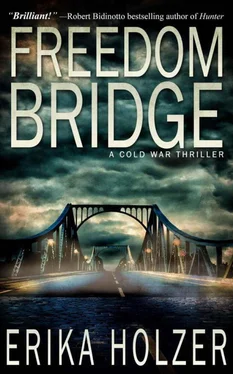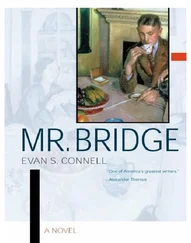Everyone in the room looked grim.
“There’s no other way,” Albert said.
Kiril, Adrienne, and Brenner spent the rest of Tuesday evening mulling over their own thoughts.
Kiril relived the years he had spent making plan after plan to defect from the Soviet Union.
Adrienne thought of the sham her marriage had become, wondering if Kurt’s love for her had been illusory from the start—and why she had no doubts at all that Kiril’s feelings for her were real.
Kurt Brenner’s mind was focused on more pragmatic matters. How to ditch the Brothers Zind before he practically suffocated to death in their six-feet-wide, three-feet-deep tool cabinet . Once he’d managed that, he would figure out how to make it to West Berlin on his own.
* * *
Late in the evening, the Zinds returned home. The tool cabinet false wall part of the plan had been executed flawlessly. The Studebaker was now parked behind the East German guardhouse with a disconnected fan belt. Construction on the truck cab and the cabinet was complete. “There’s more,” Albert told them. “In a little while we’ll take you to the old mine area. A few structures are still standing. They’ll provide some shelter. You’ll spend the rest of tonight there.”
Kiril noticed that Brenner had gone into alert.
“Before sunrise tomorrow—Thursday—you’ll make your way close to the guard houses at the mouth of the bridge. As you hide nearby, you’ll see the Studebaker parked in the back of the East German guardhouse. While it’s still dark,” Albert reminded them. “The three of you will enter the flatbed’s hidden compartment. After sunrise, I’ll show up to reconnect the fan belt, collect the bridge supports at the marshalling yard, return to load the work crew, and sit next to my East German Vopo pal while he drives us even closer to the middle of the bridge. You won’t be squeezed in that small compartment for more than a few hours,” he said, glancing pointedly at Kurt Brenner.
And was puzzled by Brenner’s expression. He seemed inattentive.
“Now we get to the tricky part,” Albert continued. “As we all know, there’s no way around it. So listen carefully because timing is everything from here on. I’m talking freedom or recapture. Life or death.”
Nobody moved. It seemed as if nobody breathed, Adrienne thought.
“Before we came home tonight,” Albert said, “we loosened the glass window in the back of the cab and replaced the back wall of the cabinet with sturdy painted cardboard. We also unscrewed the wood slats between the truck bed and the cab. They’re being held by bolts without nuts.”
Albert saw that Kiril was the only one who understood what was coming.
“The instant the work crew is off the flatbed and grouped behind it, Gunther will whistle as if it’s time to start work. Several things happen close together now. From the outside, Erich opens the driver’s door. I shove the Vopo out of the cab and jump outta the passenger’s side while Kiril—”
“Pushes out the cardboard wall, slides the six slats away, shoves the window into the cab, slips under the steering wheel, pushes the starter and engages the gears, and drives like hell to the West,” Kiril said vehemently.
He had a frightening flash image of Stepan Brodsky having done the same thing—until he realized that Stepan had commandeered his diplomat friend’s limousine not f rom the middle of the bridge, but way back at the guard houses. With East German and Soviet firepower covering both the guard houses and the watch towers, the odds of his friend making it across had been near impossible, he thought bleakly.
Chapter 49
Kiril, Adrienne, and Brenner entered a ramshackle Quonset hut. Debris was everywhere. Missing windows, twisted metal, empty file cabinets, upturned furniture.
Knowing none of them would get any much-needed sleep if Kurt pulled another attempted-rape scene, Adrienne deliberately kept Kiril between them, bedding down with some heavy blankets that the Zinds had left for them.
All three of them slept in their clothes, removing only their shoes.
The day’s events had taken a heavy emotional toll.
Kiril wondered whether he—whether all three of them—would live to see another night. Even though he was utterly fatigued, he forced himself to stay awake until he heard the rhythmical breathing of the others. Minutes later, he fell into a deep sleep.
When he awakened, he had a long moment of disorientation… Sunrise, he reminded himself. Thursday.
Adrienne was still asleep, her face in repose. He turned in the direction of Kurt Brenner.
Gone .
“Adrienne,” Kiril whispered, gently shaking her awake. “Your husband’s not here.”
* * *
Kurt Brenner had feigned sleep until Adrienne and Kiril’s regular breathing told him they really were asleep. Carrying his shoes, he moved soundlessly through the Quonset hut. He knew that the dirt trail they’d walked down with the Zinds the night before would take him to the blacktop road—and from there to the Havel River.
Outside, he slipped into his shoes and, keeping off the trail, moved cautiously parallel to it through dense underbrush. He headed for the road with only a sliver of moon for light. Once he got there, he began to follow it while still keeping himself hidden in the underbrush.
Dawn was about to break when he stopped to rest. His plan was to reach the river in early daylight, then hide nearby until the fracas on the bridge started later in the morning. Then under cover of the ensuing chaos, he would swim for the west side of the Havel River—he was a powerful swimmer—and put an end to this long, drawn-out nightmare.
As Brenner crawled on his belly through the underbrush, obscured by foliage, he kept Glienicker Bridge and the Havel River in sight.
A watchtower Vopo noticed what appeared to be movement. Unsure if he could trust his eyesight because dawn had not yet broken, the Vopo looked away. But when he quickly looked in the same direction again, the movement under the foliage was even closer to the river.
Von Eyssen was halfway out the door when the buzzer rang on his desk. He frowned with annoyance, hoping whoever it was wouldn’t make him late for his appointment with a Soviet major general who didn’t like to be kept waiting.
“It’s some captain from the Potsdam checkpoint,” his secretary apologized. “He insists on speaking with you.”
Potsdam? The major general will have to wait.
“Put him through.”
“We’ve got him!” The voice from Potsdam was triumphant. “We’ve got the Russian spy. The one you’re looking for.”
“Kiril Andreyev? You’re certain?”
“It’s him, all right. I just checked out the latest bulletin. No question that it’s him.”
“What about the American couple?”
“Andreyev was alone.”
“Did you search him yet?” von Eyssen asked, trying to keep the concern out of his voice.
“No.”
“Do it the second we get off the phone.”
“Yessir.”
“Have the Russians been informed?” von Eyssen asked cautiously.
“They must have been. That’s how it always works with defectors.”
Too bad. What will Colonel Aleksei Andreyev do when they contact him? Make a run for Glienicker Bridge, of course. If Andreyev gets hold of his brother’s lighter first, he’ll destroy it and then I’ll be back where I started—his word against mine.
“You want me to search him before the Russians take him, Colonel?”
“Take him? Take him where?”
“I don’t really know,” the captain said. “That’s what happens every time with defectors. Our Russian comrades get them first. Then us.”
Читать дальше












